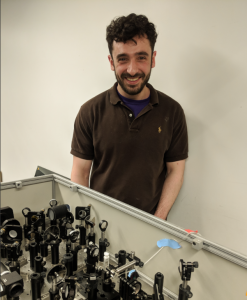Nanotechnology at Northwestern
Meet Mohamad Kodaimati, a 5th-year graduate student in the Schatz and Weiss groups
May 10, 2019
 Where did you complete your undergraduate degree?
Where did you complete your undergraduate degree?
I completed my undergraduate studies at the University of Chicago—a few train rides away from Northwestern.
When did you first become interested in chemistry?
Since I was about 6 or 7 years old, my father instilled in me the importance of science and its role in bettering mankind. As a result, I grew up wanting to be a scientist and do impactful things. In high school, I took a few chemistry classes and came to the (obvious) realization that everything we interact with is chemistry. Tables, drugs, food, water, gasoline, etc. are all just assemblies of different molecules—and can therefore be studied using chemistry. The versatility of chemistry in addressing many different problems such as water purification, climate change, health care, etc. really appealed to me and that’s when I started to become seriously interested in chemistry.
How do you explain what you study to people that don’t know anything about nanotechnology?
Generally, biology is a good starting point since people tend to be a tad more interested in biology. Biological systems are amazingly effective in their functionality—you could think of how the brain operates, how muscles allow us to move, etc.
One prime example would be chloroplasts within leaves. Within chloroplasts, you will find bundles of pigments (things that absorb light) that are arranged in a way that allows them to pass absorbed light energy between themselves. These pigments then funnel this energy to specific sites which then initiate the chemical reactions associated with photosynthesis. Nature uses this energy hoping to overcome the relatively diffuse nature of sunlight by using many pigments to increase the probability of light absorption.
Of course, humans would also like turn sunlight into some sort of fuel, but we would like to be a bit more efficient than nature (if we can). Part of my research focused on creating systems that fulfill the same function as the pigments within chloroplasts but with better materials and structure.
Can you tell me about some potential applications for your work?
One obvious application of the above research is in solar fuels production (i.e., turning solar energy into chemical energy which we can then burn). This involves things like splitting water into H2 and O2, and sequestering and converting CO2 into things we can burn (methanol, ethylene, etc.)
Where do you hope to be with your career in the next five years?
Hopefully, I will be working on an incredibly challenging problem currently faced by society. It would be even better if I had actually made some progress.
Can you tell me about your experiences either being mentored or mentoring others here at Northwestern?
Truly excellent. I have been very lucky to have Emily and George as my advisors. They are both very dedicated to helping us grow as individuals/scientists as well as helping us hash out the technical issues for whatever project that we are working on. I would attribute most of my success in grad school to my advisors. The rest comes from the post docs who mentored me as well as my mentees; both groups have allowed me to continuously learn new things. Their diverse backgrounds and skill sets have constantly helped me improve on my shortcomings and just learn more “things” in general.
What’s the best part about being a student in the Schatz/Weiss groups?
Well, aside from George and Emily, it would have to be the people. People are generally enthusiastic about science and curious about learning new things; it makes for a great work environment. I think everyone brings something different to the table, providing valuable expertise and opportunities to learn.